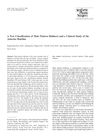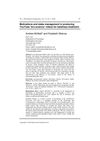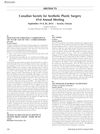TLDR The review concluded that male pattern baldness is mostly seen negatively, affecting attractiveness and social appeal.
The 2001 review article by R. Henss explored the social and psychological effects of male pattern baldness (MPB), revealing that while baldness can be associated with positive traits such as higher occupational prestige and intelligence, it is more commonly linked to negative perceptions like lower physical attractiveness, self-assertiveness, and social appeal. A study involving 108 participants showed that balding men were seen as less attractive and older than their actual age. Although baldness did not significantly impact perceptions of being a good spouse or career/intellect attributes, it did lead to lower ratings in cheerfulness, attractiveness, and perceived intellect/career success. The review also noted that facial features could influence how baldness affects perceptions of personality traits and age. Despite these findings, the review acknowledged that hair is just one factor in person perception and that advancements in hair loss treatments might alter future views on baldness. Overall, the review concluded that MPB has a predominantly negative impact on social perceptions, which can have real-life consequences.
 581 citations
,
October 1998 in “Journal of The American Academy of Dermatology”
581 citations
,
October 1998 in “Journal of The American Academy of Dermatology” Finasteride safely and effectively treats male pattern hair loss, but may cause reversible sexual issues and harm male fetuses.
 68 citations
,
February 1990 in “Journal of Applied Social Psychology”
68 citations
,
February 1990 in “Journal of Applied Social Psychology” Bald men are often viewed more negatively and as older than they really are.
26 citations
,
October 1988 in “Clinics in Dermatology” Baldness treatments focus on improving appearance and have psychological impacts.
 21 citations
,
January 2000 in “Aesthetic Plastic Surgery”
21 citations
,
January 2000 in “Aesthetic Plastic Surgery” Researchers created a new system to classify male baldness, finding six types and a common hairline shape, to improve hair loss treatments.
 August 2016 in “Journal of Investigative Dermatology”
August 2016 in “Journal of Investigative Dermatology” Some men don't respond to common hair loss treatments, but a new inhibitor, FOL-005, shows promise for targeting unwanted hair growth.
 1 citations
,
January 2018 in “International Journal of Web Based Communities”
1 citations
,
January 2018 in “International Journal of Web Based Communities” Creators of YouTube 'bro-science' baldness videos are driven by a need to share and persuade, often emphasizing authenticity and community building, while navigating trust issues related to commercial ties.
 August 2014 in “Plastic Surgery”
August 2014 in “Plastic Surgery” Dr. WP Unger suggested that traditional strip harvesting might be better for hair transplants than Follicular Unit Extraction due to higher hair survival rates and less risk of a patchy look at the donor site.
 12 citations
,
October 2021 in “Cells”
12 citations
,
October 2021 in “Cells” Targeting a protein that blocks hair growth with microRNAs could lead to new hair loss treatments, but more research is needed.







